
In a bold move towards solidifying its position as a global space power, India sets its sights on a monumental goal: achieving a five-fold increase in its share of the global space economy. Spearheading this visionary endeavor is Jitendra Singh, the Minister of State for the Department of Space, whose leadership and determination are propelling India towards new frontiers in space exploration and innovation.
India’s journey in space exploration dates back to the historic launch of Aryabhata, its first satellite, in 1975. Since then, the Indian Space Research Organisation (ISRO) has made remarkable strides, with milestones including the Chandrayaan and Mangalyaan missions, which showcased India’s prowess in lunar and Mars exploration, respectively.
As India looks to the future, the focus extends beyond mere exploration to leveraging space technology for economic growth and societal development. With a burgeoning domestic space industry and a track record of successful satellite launches and space missions, India is well-positioned to capitalize on the opportunities presented by the global space economy.
Key to India’s ambitious goal is the expansion and diversification of its space capabilities, encompassing satellite manufacturing, launch services, satellite-based applications, and space tourism. By fostering collaboration between government agencies, private enterprises, and academic institutions, India aims to create a robust ecosystem that fuels innovation and drives economic growth in the space sector.
India’s space ambitions are bolstered by a growing demand for satellite-based services such as communication, navigation, earth observation, and remote sensing. With the advent of emerging technologies like small satellites, reusable launch vehicles, and space tourism, the space economy presents immense opportunities for countries with the vision and capability to seize them.
Furthermore, India’s commitment to international partnerships and collaborations is poised to play a crucial role in its quest for a larger share of the global space economy. Through initiatives like the International Space Station (ISS) and joint missions with other spacefaring nations, India seeks to leverage collective expertise and resources to achieve common goals and advance scientific knowledge.
However, India’s ambitions in space are not without challenges. Competition from established space powers, technological barriers, and budgetary constraints pose significant hurdles on the path to realizing its goals. Moreover, ensuring the responsible and sustainable use of space resources is paramount to safeguarding the long-term viability of space exploration and utilization.
To overcome these challenges, India is adopting a multi-pronged approach that emphasizes innovation, collaboration, and strategic planning. Investments in research and development, capacity-building initiatives, and policy reforms are essential components of India’s strategy to enhance its competitiveness and relevance in the global space arena.
In conclusion, India’s pursuit of a five-fold increase in its share of the global space economy reflects its unwavering commitment to harnessing the transformative power of space technology for the benefit of humanity. With visionary leadership, strategic planning, and concerted efforts across public and private sectors, India is poised to carve out a prominent place for itself in the annals of space exploration and innovation. As the nation embarks on this ambitious odyssey, the world watches with anticipation, eager to witness the next chapter in India’s space saga.

